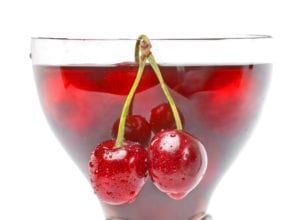Written by Angeline A. De Leon, Staff Writer. Sixty ml of Montmorency tart cherry juice significantly elevated total hemoglobin and oxygenated hemoglobin and significantly reduced systolic blood pressure in 27 participating healthy 40-60 year olds, but did not improve cognition or mood.
 Prunus cerasus, commonly referred to as Montmorency tart cherries (MC), represents a group of functional foods known for their ability to modulate blood flow. In a number of clinical trials, cherry extract has been found to exert unique cardiometabolic effects, including the attenuation of inflammation and oxidative stress, as well as increased nitric oxide production associated with improved overall blood circulation 1. Rich in polyphenols (micronutrients with antioxidant activity), MC is particularly effective in modulating vascular smooth muscle response and may have applications in countering age-related decline in cerebral blood volume and oxygen metabolism 2. In older adults, this reduced ability to properly modulate blood flow in the brain is thought to underlie the break-down in neuronal communication associated with aging, inevitably leading to increased risk for cognitive impairment and other neurodegenerative disorders 3,4. Early studies demonstrate that supplementation with tart cherry extract can improve working memory in animals 5, but the effects of polyphenol-rich foods on cerebrovascular response is still being studied in human subjects. To this end, researchers at Northumbria University in the UK conducted an investigation examining the influence of Montmorency tart cherry juice on vascular function and cognitive performance in a population of middle-aged adults.
Prunus cerasus, commonly referred to as Montmorency tart cherries (MC), represents a group of functional foods known for their ability to modulate blood flow. In a number of clinical trials, cherry extract has been found to exert unique cardiometabolic effects, including the attenuation of inflammation and oxidative stress, as well as increased nitric oxide production associated with improved overall blood circulation 1. Rich in polyphenols (micronutrients with antioxidant activity), MC is particularly effective in modulating vascular smooth muscle response and may have applications in countering age-related decline in cerebral blood volume and oxygen metabolism 2. In older adults, this reduced ability to properly modulate blood flow in the brain is thought to underlie the break-down in neuronal communication associated with aging, inevitably leading to increased risk for cognitive impairment and other neurodegenerative disorders 3,4. Early studies demonstrate that supplementation with tart cherry extract can improve working memory in animals 5, but the effects of polyphenol-rich foods on cerebrovascular response is still being studied in human subjects. To this end, researchers at Northumbria University in the UK conducted an investigation examining the influence of Montmorency tart cherry juice on vascular function and cognitive performance in a population of middle-aged adults.
A total of 27 healthy middle-aged participants (aged 45-60 years) were enrolled in a randomized, double-blind, placebo-controlled trial using a cross-over design. Participants were randomly allocated to receive 60 ml of MC concentrate (which was measured for antioxidant activity) or placebo in the first arm of the study, separated by a washout period of 14 days and followed by the second arm of the study. At baseline and 1, 2, 3, and 5 hours following consumption, cerebral blood flow velocity was measured using a doppler probe at the middle cerebral artery, and cerebral oxygenation (based on concentrations of hemoglobin, Hb) was assessed using a non-invasive, light-based brain imaging technique. Participants also completed a battery of cognitive and emotional functioning tests and were measured for blood pressure.
One hour following intake of MC, significant elevations were detected in total Hb and oxygenated Hb (p < 0.05 for both). Over a period of 3 hours following MC administration, significant reductions in systolic blood pressure were also observed (p < 0.05), with the greatest reductions, relative to placebo (6+/- 2 mmHg), occurring after the first hour. No significant changes in cognitive performance or mood were reported.
As the first study to investigate the impact of MC supplementation on cerebrovascular parameters and cognition in middle-aged adults, findings support the acute effects of cherry extract on cerebral blood flow. While modulation of cerebrovascular response in the frontal cortex (indexed by increased concentrations of total and oxygenated Hb) was evident as soon as within two hours of intake, results did not translate to improvements in cognitive performance or mood. Further research is needed to replicate findings and examine this discrepancy.
Source: Keane KM, Haskell-Ramsay CF, Veasey RC, et al. Montmorency tart cherries (Prunus cerasus L.) modulate vascular function acutely, in the absence of improvement in cognitive performance. British Journal of Nutrition. 2016; 116: 1935-1944. DOI: 10.1017/S0007114516004177.
© 2016 American Society for Nutrition
Posted December 28, 2017.
References:
- Wang HB, Nair MG, Strasburg GM, et al. Antioxidant and anti-inflammatory activities of anthocyanins and their aglycon, cyanidin, from tart cherries. J Nat Prod. 1999; 62, 802–802.
- Marchal G, Rioux P, Petittaboue MC, et al. Regional cerebral oxygen-consumption, blood-flow, and blood-volume in healthy-human aging. Arch Neurol. 1992; 49, 1013–1020.
- Shukitt-Hale B, Lau FC & Joseph JA. Berry fruit supplementation and the aging brain. J Agric Food Chem. 2008; 56, 636–641.
- Shukitt-Hale B, Carey A, Simon L, et al. Effects of Concord grape juice on cognitive and motor deficits in aging. Nutrition. 2006; 22, 295–302.
- Thangthaeng NP, Gomes SM, Miller SM, et al. Tart cherry supplementation improves working memory, hippocampal inflammation, and autophagy in aged rats. Age (Dordr). 2016.

